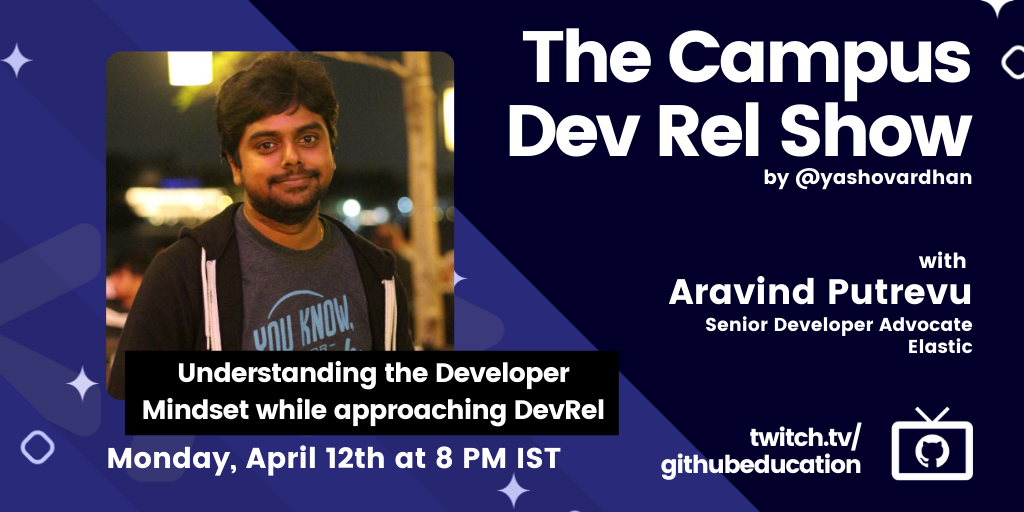Understanding the Developer Mindset while approaching DevRel - Aravind Putrevu


Hello! Glad to see you back here. The last episode was really exciting for a lot of folks out there, especially students part of the GitHub student community (Campus Experts). Specially since Juan was the guest speaker and he literally shared tons of insights. I do feel his journey is pretty amazing and there’s a lot to learn from it. Having said that, make sure you check out the last episode of The Campus DevRel Show if you haven’t already. If this is the first time you’ve landed on our blogs, make sure you check out DevRel.Page for more info!
Now that our introduction’s all sorted, let’s dive into episode 3!
Yash first met this episode’s guest speaker, Aravind, at Hackference India where he was a speaker at their DevRel conference. They further met at many other developer conferences in the APJ region. Following this, Aravind became like a mentor to Yash, making a significant impact in the way he approached his DevRel career Aravind at the time of the episode introduced himself as a “Developer” first then “Developer Advocate” for Elastic — one of the few things that make him connect deeply with the community.
Aravind’s journey into open source as a student, learnings as a developer and the shift to developer communities.
Aravind’s journey into open source started when he was still in college. He stressed the fact that it’s so much easier for students nowadays to get involved in communities, as compared to his time, showing how impactful the DevRel ecosystem has been. Aravind at his time had to search for like-minded people to collaborate with and organise interesting sessions. He recalls that at his first meetup he was surprised to even find out that there’s a place, existing in the world, where folks from various backgrounds meet and discuss code, where they are provided with the resources and surprisingly, FREE FOOD! At that time, he wasn’t that aware of developer relations but at the back of his mind, he always knew that he wanted to become a teacher of some kind.
His journey as a developer started with his keen interest in Java as he absolutely disliked C and C++, for various reasons. He worked on everything in and around Java at that time even though he had no idea about open source. In the initial days of his career, he wasn’t aware of the existence of JUGS (Java User Groups), he was only aware of NetBeans at that point. He joined a system-integrated services company called Syntel, where he was right away introduced to a large-scale banking system product that had a lot of legacy systems involved.
Later, he moved to Bangalore, India, where he was fascinated with the developer ecosystem within the country. He found out about the weekly meetups there, focusing on Android and Google Developer Groups, where he liked the approach of teaching developers. He was a bit shy at first but knew that this is what he wanted to do. He says he owes a lot of credit to Google Developer Groups for their mentorship. He eventually started branching to other existing community groups, and from his current work in the cloud, he found out about the Digital Ocean, where he eventually became their community ambassador.
What were the skills Aravind learnt being a community organiser and what were the skills that got him such an opportunity?
For Aravind, it was never about the swags or other benefits of being a community organiser or ambassador, he was just happy to connect with people on a Saturday morning and enjoyed the whole process of meeting, learning something new over a few snacks. He was very active in multiple communities and was actively participating in conversations — that’s how he started getting recognition in the first place.
After becoming a community ambassador he understood the process of organising the event, right from getting the speakers, arranging swags & food to fixing a venue and all sorts of stuff.
A side question — How to make social media engagement more interactive in the developer world?
There isn’t one silver bullet. Any developer in general likes their problems to be solved. Although, it’s pretty common that a developer at a conference might end up asking questions about an error and anyone in the room doesn’t have a clue about solving it. Aravind suggests making sure to keep your live streams, podcasts and other engagement content, short and visual. Visual here means that you talk through a thing while showing relevant content around it rather than just showing the information you are going to speak about. Additionally, any video/ audio content repurposed into the blog, attracting further audiences (we’re doing the same here 😱).
Aravind’s transition from community organiser to a developer advocate 🥑
As we mentioned earlier, Aravind always wanted to be a teacher of some kind, where he could talk to people, solve and explain the various problems they’re having. It was something that he always liked and hence he was also usually the person who did internal team presentations. While being a community organiser for Digital Ocean, he realised it would be very easy for him to transition into the role based on the ease with which he spoke to other people, developers in particular. But once he actually got into the role, it was much deeper than he initially thought. Aravind stresses the fact that the transition, especially given that there are not a lot of opportunities in this world of Developer Relations, can be very challenging for new-comers. He explains that the journey has not been that easy and he was keen on getting the title of Developer Advocate. It took him almost 8 months of applying to various opportunities, where he faced a lot of rejections.
It’s really important to be a developer first — to have the developer mindset, to understand how developers think to get an edge in DevRel Space.
Handling rejections is always tough but the focus on the end goal should not be lost in the process. Keep in mind that it’s always for the best and good things will eventually happen. However, at the same time, Aravind also stresses the fact that if you have spent almost 6 months trying for a role, make sure to take a step back and evaluate the whole process. Go through each and everything you have undertaken to reach that point and look for a change or pivot. Make sure to ask for help from other connections who you really think can help out in the process and pinpoint the areas of improvement.
This is something very similar to what Deepak had tweeted to summarise this episode! Make sure you check it out here.
That was indeed a great insight into Aravind’s journey, filled with a lot of takeaways. This wraps up today’s blog of The Campus DevRel Show!
Make sure to check out the previous episode If you haven’t already! Also, don’t forget to check out DevRel.page, we have lots of content to get you started with your journey in exploring everything in and around Developer Relations.
Like always, get out there, build great connections, share your work with others. Keep grinding! Keep working! And most importantly, keep learning! we’ll catch you in the next one.

